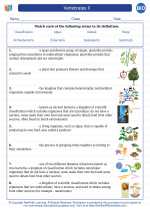Steroids
Steroids are a class of organic compounds that have a characteristic molecular structure consisting of four rings arranged in a specific configuration. They are found in plants, animals, and fungi and play important roles in various biological processes. In the context of human biology, the term "steroids" often refers to a specific subgroup known as "steroid hormones," which are produced in the endocrine glands and have diverse physiological effects.
Types of Steroids
There are several types of steroids, including:
- Corticosteroids: These are hormones produced by the adrenal cortex and are involved in regulating metabolism, immune function, and stress response.
- Sex Hormones: These include androgens (e.g., testosterone) and estrogens (e.g., estradiol), which play key roles in reproductive function and secondary sexual characteristics.
- Anabolic Steroids: These synthetic variants of the male sex hormone testosterone are often used to promote muscle growth and enhance athletic performance.
Biological Functions
Steroid hormones exert their effects by binding to specific receptor proteins inside target cells, leading to changes in gene expression and cellular activities. For example, corticosteroids regulate metabolism and immune function, while sex hormones control reproductive processes and secondary sexual characteristics.
Medical and Recreational Use
Medically, steroids are used to treat a variety of conditions, including inflammatory disorders, hormone deficiencies, and certain types of cancer. However, the non-medical use of anabolic steroids for performance enhancement is a controversial and potentially dangerous practice, as it can lead to adverse effects on physical and mental health.
Study Guide
When studying steroids, it's important to focus on the following key points:
- Understand the chemical structure of steroids and how it relates to their biological functions.
- Learn about the different types of steroid hormones and their specific roles in the body.
- Explore the mechanisms of action by which steroid hormones exert their effects on target cells.
- Examine the medical uses of steroids, including their therapeutic applications and potential side effects.
- Evaluate the ethical and health-related implications of non-medical steroid use, particularly in the context of athletic performance enhancement.
By mastering these concepts, you will develop a comprehensive understanding of steroids and their significance in human biology.
.◂Biology Worksheets and Study Guides High School. Vertebrates II

 Worksheet/Answer key
Worksheet/Answer key
 Worksheet/Answer key
Worksheet/Answer key
 Vocabulary/Answer key
Vocabulary/Answer key
 Vocabulary/Answer key
Vocabulary/Answer key
 Vocabulary/Answer key
Vocabulary/Answer key
